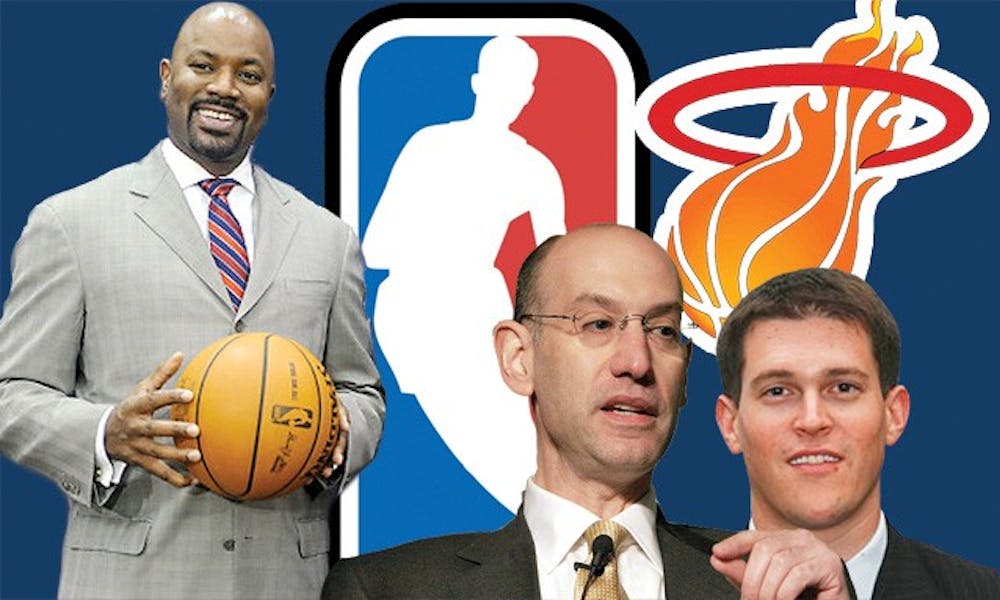Editor’s note: This is Part 1 of a three-part series spotlighting the connection between the NBA and Duke Basketball. Today, Harrison Comfort writes about the many Duke alums currently occupying jobs in NBA front offices. Tomorrow, The Chronicle looks into why Duke has its large presence in professional basketball and Thursday, the focus moves to the future of Duke basketball players entering the 2011-12 season.
Duke may have the second-most active players in the National Basketball Association this year, but the school’s influence extends far beyond the court.
A general manager, the second-most powerful man in the NBA and even the executive who helped bring together the Miami Heat’s coveted trio all graduated from Duke. All have greatly influenced today’s brand of professional basketball—without ever even wearing an NBA uniform.
“Duke students have a great reputation in this league,” said NBA Deputy Commissioner Adam Silver, who graduated in 1984 with a degree in political science. “The number of Duke students who now work in the league is impressive.... It makes me feel great as a Duke alum that we can make such an enormous contribution to the NBA and are so well respected not just on the floor, but in executive positions as well.”
One of those alumni in an executive position is Billy King, captain of the 1988 Final Four team. After starting out in broadcasting for ESPN, King soon took to working in NBA front offices, eventually earning the top position for the New Jersey Nets. There, he manages players, coaches and team personnel.
With old friends in similar positions, like former All-American teammate Danny Ferry—the Vice President of Basketball Operations for the San Antonio Spurs—King has found that he constantly seems to reconnect with Duke graduates in his line of work. One recent example came during trade negotiations when the Nets acquired All-NBA point guard Deron Williams in March. Williams needed a place to live after he was traded, and King connected with friends from his Duke days who work in New Jersey real estate to find accommodations for his new point guard.
“A lot of the people I met while at Duke, I feel I have a great relationship with and have come to interact with them,” King said.
Like King, Silver also held a passion for basketball as an undergraduate at Duke—even if he never played under Mike Krzyzewski. After receiving his J.D. from Chicago Law School, Silver joined the NBA, moving his way up to become the league’s second-highest executive.
Silver oversees most of the league’s sponsorships and television agreements while acting as the lead negotiator for the collective bargaining agreement between players and owners, which expires at the end of this season. Also in charge of the NBA’s international expansion, Silver has traveled with the U.S. National Team for the past few summers, including during the 2008 Beijing Olympics.
Although the Deputy Commissioner never met Krzyzewski as a student, Silver worked closely with the National Team’s head coach during the Olympics in his role as the head executive. He even used his academic background in foreign policy to brief the players on China’s political situation.
“At Coach K’s direction, I addressed the team and got to use my political science degree, and explained to them the communist system of government and economic system in China as well,” Silver said. “I got a ‘good job’ from Coach K at the end.”
Silver isn’t unique in being proud of a ‘good job’ from Coach K. It was Krzyzewski’s coaching philosophy, in which the team comes before indviduals, that helped create bonds among the league’s elite players in China in 2008.
Someone who saw that firsthand was Nick Arison, now the Vice President of Basketball Operations for the Miami Heat, which recently signed LeBron James, Chris Bosh and Dwyane Wade, all of whom played for the gold-medal winning team.
Arison served as a manager during Duke’s 2001 championship run, and he spent four years total working for the team. After graduation, he continued a career in basketball and during the 2004 Athens Olympics began work with the U.S. National Team in day-to-day operations, a position he still holds. When Krzyzewski and Duke associate head coaches Chris Collins and Steve Wojciechowski joined Team U.S.A., Arison found himself in familiar territory.
“When Coach K took over, I already had a relationship with both groups that had come together, and it was a seamless transition,” Arison said. “It was a lot of fun to be around those guys on a day-to day basis and we reminisced a lot.... The Duke basketball family is like my home away from home—it was nice to be able to spend so much time with them.”
And while that Duke basketball family will continue to make an impact on the floor in the NBA, the university’s alumni also wield considerable influence off the court, from the Commissioner’s office to the United States national team, creating a kind of basketball fraternity, the Heat executive explained.
“There are tons of us,” Arison said. “We are everywhere.”
Andy Moore contributed reporting.
Get The Chronicle straight to your inbox
Signup for our weekly newsletter. Cancel at any time.

